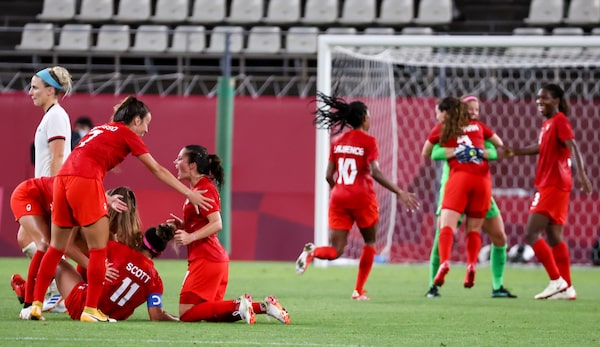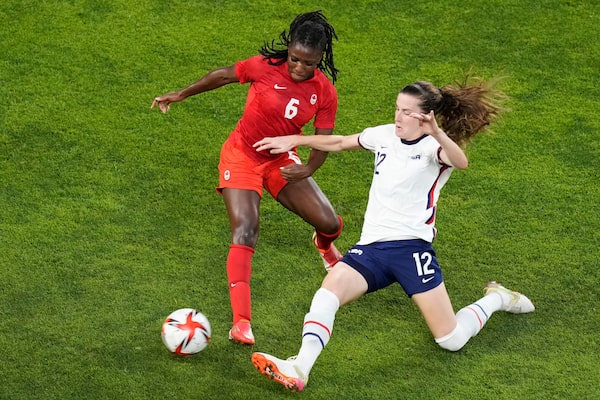
The Canadian women’s soccer team celebrates its 1-0 semi-final win over the United States at Ibaraki Kashima Stadium on Monday. Canada won on a penalty kick goal, putting Canada through into the gold medal match set for Aug. 6.Melissa Tait/The Globe and Mail
Most of the time you don’t get your revenge. Things don’t even out in the end.
Occasionally, you will get payback in some form, but it’s often cheap and out of context.
Very, very rarely in life you will get the full turnaround. That the wrong done to you is visited back on your antagonist.
That’s what the Canadian women’s soccer team got on Monday night in Kashima against the United States.
Nine years after one of the great rip-offs in Olympic history, Canada got the benefit of officiating that ran to the letter of the law, while entirely missing the spirit of the game. It directly results in this country heading to a gold-medal game the Canadians were robbed of at the London Games in 2012.
The greatest game of women’s soccer ever played
Monday’s game was what the British call “absorbing” – which is to say sloppy, but even.
The United States hasn’t looked anywhere close to its best in Tokyo – “ripe for the picking,” Canada’s veteran captain Christine Sinclair said afterward. But they still come forward with brutal purpose.
In the second half of a goalless game Monday, the U.S. began hitting Canada in waves. After 60 minutes, the Americans subbed in three new forwards, including two former world players of the year. It wasn’t looking good for our heroes.
Around the 70th minute, a ball drifted back into the American area. U.S. defender Tierna Davidson chased it down on the edge of the box and made to kick it out of bounds. But Canadian forward Deanne Rose was coming in hot. As Davidson drew back her leg, Rose burst in front of her. The American inadvertently swept out Rose’s leg and both players went to the ground in a pile.

Canada's Deanne Rose, left, and United States' Tierna Davidson battle for the ball.Martin Mejia/The Associated Press
No one on the pitch or in the stands (there weren’t many of us) reacted. The ref called for a goal kick. But then there was a pause. The Ukrainian referee signalled that the VAR (video assistant referee) would take a look at the incident. Again, no one reacted. This seemed like a brief water break at best.
Then the referee pointed to the spot. Penalty kick for Canada.
The Americans didn’t complain because none of them had seen what happened. Canada’s Jessie Fleming stepped up – a passing of the torch moment – and sank the penalty. 1-0 Canada. It would end that way.
You could certainly argue it was a penalty. Inside the area, Davidson catching Rose on the back of the leg. But you can just as easily argue that the six-second violation given against Canada in this same match-up in 2012 was a foul.
The point is this – at that time in a tight, goalless game, against the run of play, with a gold medal opportunity on the line, that is not a penalty, just as it wasn’t a foul in 2012. VAR didn’t fix the match for Canada. But it gift-wrapped it up for them.
Jessie Fleming of Canada scores their first goal from the penalty spot against Adrianna Franch of the United States.EDGAR SU/Reuters
Back in 2012, the Canadian team came out after the match frothing.
Nine years later, the U.S. seemed more exhausted than anything. The most animated player was veteran star Carli Lloyd.
She came into the mixed zone angry. When the volunteers tried to enforce the two metres of distance between herself and reporters, Lloyd ignored them. When they surrounded her and seemed about to lay hands on her, she moved back a step. That was as far as she’d go.
“Heartbreaking,” Lloyd said, hands on hips, sweat rolling off her.
And the call? “I couldn’t really see it.”
Well, wait until that happens. Then get back to us.
Back in 2012, the American reaction had been triumphal. The then-coach, Pia Sundhage, was asked if she felt bad for the Canadians. She smirked.
This time, the Canadians were very careful not to rub it in.
“I feel like our team is completely different from 2012,” said Desiree Scott, one of the two Canadian starters on Monday who’d been on the field at the London Games.
And Deanne Rose? How’d the penalty look from her extremely up-close perspective?
“You guys saw what happened,” Rose said. That’s as detailed as she’d get.
And how about the original soccer don? Christine Sinclair had one of the great games in the history of women’s soccer back at Manchester’s Old Trafford in 2012 – three magnificent goals in a 4-3 loss.
Immediately after that game, before Canada realized they were about to become a cult favourite, Sinclair made a promise in the locker room.
“It was totally silent,” former Canada defender Carmelina Moscato remembered years later. “[Sinclair] said, ‘This is never going to happen again,’ and, ‘We’re going to get them,’ and, ‘We’re going to get them next time.’”
At 38, Sinclair is not the player she once was. Instead, she has become the Clint Eastwood of world soccer. It took her nine years and a lot of manhunting, but she settled the score.
“It was nice to get a little revenge,” Sinclair called it Monday, not willing to escalate a beef that has cooled recently.
That’s another change from 2012. Back then, the captain came out in the mixed zone and accused the ref of fixing the game.
Sinclair was 17 the last time Canada beat the United States, just about to begin her international career. Since then, she has established herself as arguably the finest female team athlete this country has produced. She took a program, put it on her back and dragged it from the developmental stage to developed.
On Thursday, 10 p.m. ET, she will finally play for that gold medal, against Sweden.
Reflecting on the experience of London a few years ago, Sinclair was the one member of the team who wasn’t nostalgic about it. Despite the quality of her performance, she’s never watched the video.
“It’s weird,” Sinclair said back then. “Everyone talks about that game, and I just say, ‘We lost. We lost.’ My uncle showed me a list of people that had scored a hat trick at Old Trafford. I said to him, ‘I guarantee you I’m the only one up there who lost.’”

Christine Sinclair of Canada during the women’s soccer semi-final at Ibaraki Kashima Stadium on Monday.Melissa Tait/The Globe and Mail
Canada can’t right the wrong of 2012. More than a dozen women who were there won’t share in whatever medal the team wins here in Tokyo.
But they can complete one of the most epic turnarounds in the history of Canadian sport. They can do what almost no athlete ever gets to do – spin the karmic wheel backward.
Sign up for The Globe’s Olympic newsletter and follow all of the news, features and opinion in the Summer Games in Tokyo.
 Cathal Kelly
Cathal Kelly